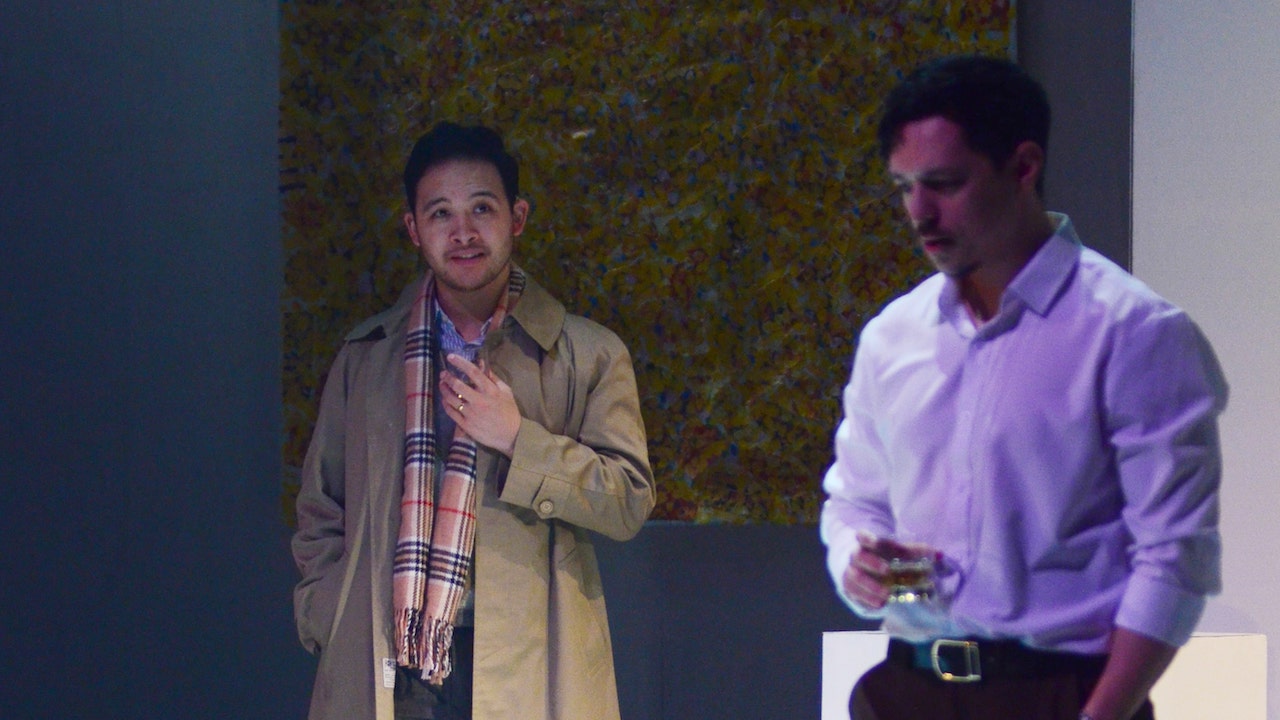
REVIEW: ‘Betrayal’ attempts to place Pinter in the diaspora
Repertory Philippines’ production of Harold Pinter’s 1978 play celebrates the playwright’s use of language but doesn’t clearly convey its British-Filipino perspective.
Stories have used infidelity as a driving force for drama arguably since stories started being written. In the Philippines, there’s even a whole industry for “kabit” stories, broadcast across the nation at primetime and in major theater chains—a tradition that the late British playwright Harold Pinter probably never imagined he would contribute to. Repertory Philippines’ new production of Pinter’s Betrayal is set specifically within the context of the Filipino diaspora, following (in reverse) the seven-year-long affair between an art curator and her lover, who also happens to be her husband’s best friend. Here, all three characters are meant to be second-generation British-Filipino.
On its own, Pinter’s play is a great story not just about adultery but about the nuances of trust and desire among these flawed, often frustrating human beings. In this new context, however, this version of Betrayal doesn’t clearly communicate its insights on the lives of these people in the diaspora—obscuring the intent of some of its creative choices and, as a result, leaving its storytelling feeling insufficient. But it does still manage to celebrate the sheer artistry of Pinter’s words, through a spare, minimal style that can be powerful when done right.
Words as Weapons
What makes Pinter’s dialogue in Betrayal immediately striking is the way language is used like a weapon. From the very beginning, these characters use every word to get a desired reaction out of the other, or to fish for information about how much they know about each other’s secrets. There’s a clear sense of rhythm and repetition that makes certain exchanges read like barbs of poetry. And even as the play’s chronology moves backwards in time, Pinter maintains an air of mystery—peeling back the years and searching for the truth of why any of these people would hurt each other for so long.
With crisp sound design by Fabian Obispo and set designer Miguel Urbino’s simple, mostly bare stage, Pinter’s words are allowed to remain the main attraction. The world of this production is imagined as an art gallery, with the same gallery staff quietly transitioning each scene into the next—their tidiness contrasting sharply with the absolute mess the characters have gotten themselves into. And with little more than the occasional excerpt of a classical music piece breaking up these scenes, not only does the dialogue feel weightier but so do the paranoid silences between conversations.

L-R: James Cooney, Vanessa White; Photo Credit: Boboy Ramiro
Unfulfilled Promise
Where Betrayal itself gets messier is in its attempt to evoke its diaspora setting, which feels entirely secondary to this production’s loyalty to the original text. At the top of the show, it’s established that curator Emma (Vanessa White) is exhibiting works by the late Filipino-American artist Pacita Abad; her Paris in the Fall hangs at center stage for the duration of the play. And after the first few scenes, audio snippets from news reports bluntly signify that the story takes place in 2016, after the Brexit referendum and the election of President Rodrigo Duterte.
These cultural markers try to impose a specific British-Filipino element to this story, or even to add a nationalistic dimension to the decisions the characters make on stage. For example, directly after the news reports, two characters decide to get rid of the flat they’ve been using, and it seems to be implied that this is motivated in part by everything going on in the world at the time. But after this scene, the British-Filipino context all but fades from the audience’s view. Abad’s lone, ever-present Paris in the Fall is rendered an unfulfilled promise, hinting at major themes that the text is simply unable to accommodate.
In-Between Moments
All of this is done in a clean, mannered style that fits Pinter’s language but only partly makes for compelling drama. Scenes between Emma and Jerry (James Cooney), in particular, feel oddly devoid of tension—whether due to their stoic performances or the way they’re blocked together so plainly, leaving little room to complicate the nature of their relationship. But elsewhere in the show, director Victor Lirio does prove himself capable of filling in-between moments with unspoken feeling. Scene transitions (helped by John Batalla’s lighting) can contain a wealth of emotion between characters, while a brief scene in which two people circle each other in a wordless dance perfectly complement Pinter’s reliance on words.
All the best qualities of this Betrayal are ultimately contained in James Bradwell’s character of Robert—Emma’s husband, Jerry’s friend, and the “third party” whose own suspicions lead to the most interesting character moments. Bradwell’s presence immediately forces everyone else to conceal parts of themselves, and the way he searches the others’ faces for some sort of answer, or hope, or reason to be angry is heartbreaking. Even in silence, Bradwell takes his character’s private suffering and forges an unexpected path towards healing, which is exactly what Pinter’s script deserves.
Tickets: P1545 – P2575
Show Dates: Mar 1–17 2024
Venue: Carlos P. Romulo Auditorium, RCBC Plaza, Makati City
Running Time: 1 hour and 15 minutes (without intermission)
Credits: Harold Pinter (Playwright), Victor Lirio (Direction), Uriel Villar (Assistant Direction), Miguel Urbino (Set Design), Julia Pacificador (Associate Set Design, Scenic Artist), Fabian Obispo (Sound Design), Becky Bodurtha (Costume Design), Zenaida Celdran (Associate Costume Design), John Batalla (Light Design, Technical Direction)
Cast: Vanessa White, James Cooney, James Bradwell, Jef Flores, Regina de Vera
Company: Repertory Philippines


Comments